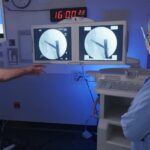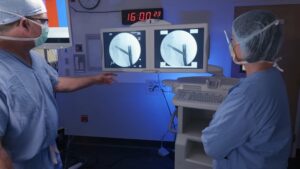Despite what many people think, you don’t always need a lot of schooling to land a high-paying job in the medical field.
In fact, there are quite a few medical careers where you can start earning good money with just a two-year associate degree, or sometimes even less you will be surprised when you see.
You can learn more here if you want to find out more about those jobs.
1. Radiation Therapist
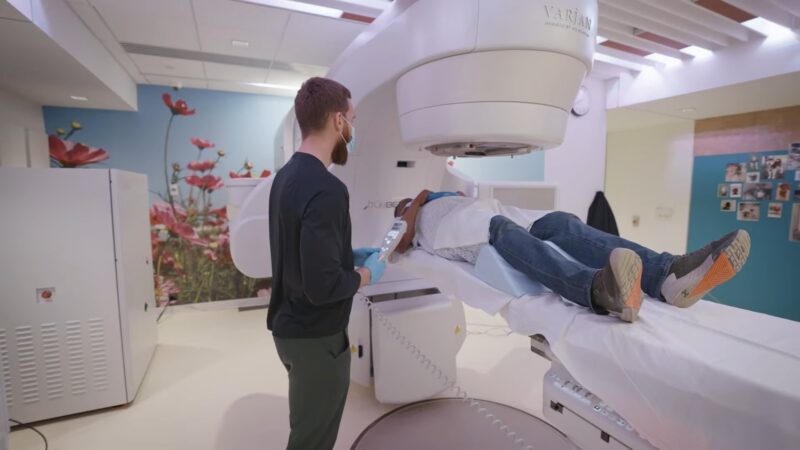
Average Annual Salary: $85,000
Radiation therapists have an important role, working closely with patients fighting serious illnesses such as cancer.
They administer precise doses of radiation to shrink tumors. Their duties involve handling the equipment correctly, calculating the right amount of radiation, and keeping detailed records of treatments and patient progress.
They also provide communication and emotional support during the treatment process.
To enter this field, you can earn an associate degree in applied science (AAS) in radiation therapy, which typically takes two years.
A key requirement for this job is to become certified in radiation therapy.
2. Dental Hygienist
Average Annual Salary: $88,500
Dental hygienists have a rewarding and well-paid job that’s relatively easy to get into.
Their main tasks include cleaning teeth, checking for oral diseases, educating patients on how to prevent dental issues, and handling some administrative duties.
To start a career as a dental hygienist, you typically need an associate degree, which can be completed in about 20 months.
Additionally, you must pass a state licensure exam and may need other certifications, depending on where you live.
3. Ultrasound Technologist
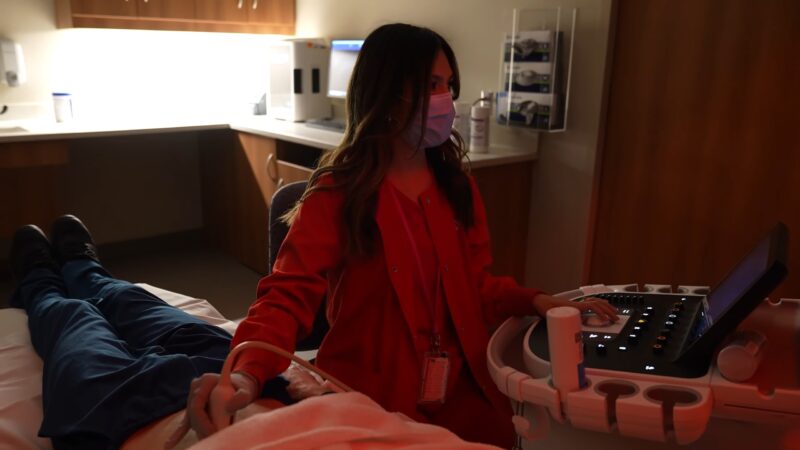
Average Annual Salary: $84,500
Becoming an ultrasound technologist is a relatively low-stress and straightforward path into the medical field.
Ultrasound technicians work in various settings, not just with pregnant women.
Their responsibilities include setting up the exam room, operating sonographic equipment, analyzing results, compiling reports, and maintaining patient confidentiality.
You can become an ultrasound technician by earning a degree in medical sonography or completing a certification program, which can take about a year.
Depending on where you live, you might also need to pass a licensing exam.
4. Registered Nurse
Average Annual Salary: $73,500
As a registered nurse, you’ll have a crucial role in hospitals and other healthcare settings, delivering treatment and medications under the supervision of doctors, ordering tests, making decisions, and discussing care plans with patients and their families.
To become a registered nurse, you can either pursue an associate or a bachelor’s degree in nursing from an accredited institution.
Depending on your nursing specialty and the state you’re in, you might also need additional certifications.
5. Healthcare Administrator

Average Annual Salary: $68,000
Healthcare administrators are responsible for managing medical staff, overseeing facility finances, maintaining medical and administrative records, and ensuring that the facility complies with healthcare laws and regulations.
To get into this role, you typically need a bachelor’s degree in business administration or a related field, along with a few years of experience in the healthcare industry.
6. Surgical Technician
Average Annual Salary: $52,000
Surgical technicians play a critical support role in the operating room, helping surgeons by preparing and cleaning surgical areas, stocking and ordering supplies, sterilizing equipment, and assisting during procedures.
To become a surgical technician, you can complete training through vocational schools or pursue an associate or bachelor’s degree program.
Most organizations prefer candidates to have at least an associate degree.
7. Physical Therapist Assistant
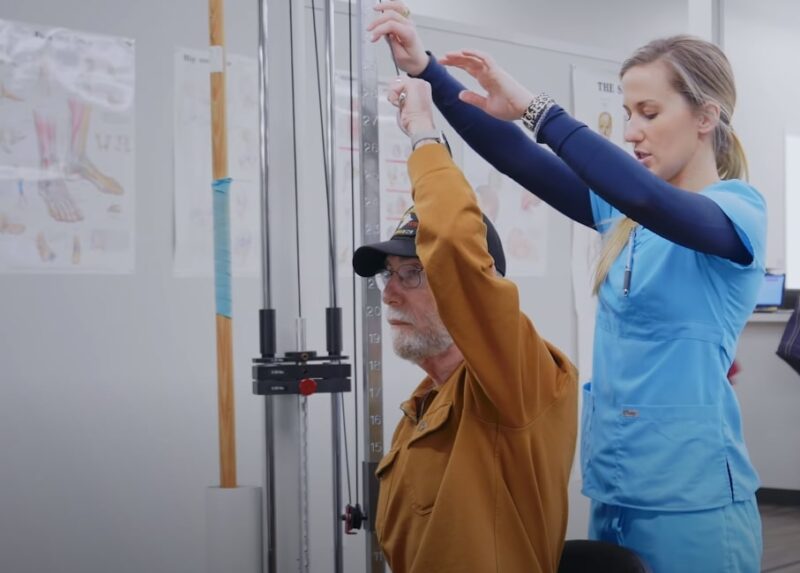
Average Annual Salary: $53,000
Physical therapist assistants support physical therapists by helping patients recover from injuries or accidents through tailored rehabilitation programs.
Their duties include monitoring patient progress, assisting with exercises, and teaching proper techniques.
To enter this field, you need an associate degree from an accredited program and must obtain a state license.
8. Patient Service Representative
Average Annual Salary: $48,377
Patient service representatives gather essential information from patients, such as contact details, health insurance, and billing data for hospitals and other healthcare facilities.
Typically working full-time day shifts, they serve as liaisons for the hospital’s services.
These representatives also help patients find doctor’s offices and different areas within the hospital and arrange transportation services when needed.
9. Medical biller and coder

Average Annual Salary: $46,294
Medical billers and coders are essential in healthcare.
They turn medical records and services into standard codes to help create invoices and manage insurance claims.
Most work full-time in hospitals or medical offices.
To get started in this career, you usually need to take a medical billing and coding course lasting from 10 months to just over a year and earn a certification.
10. Health information technician
Average Annual Salary: $49,601
Health information technicians are responsible for collecting, storing, and securing medical records.
They adhere to specific regulations for handling medical information and comply with laws like the Health Insurance Portability and Accountability Act (HIPAA).
Additionally, they ensure the accuracy of medical information and process updates requested by patients or healthcare professionals.
11. Environmental services technician
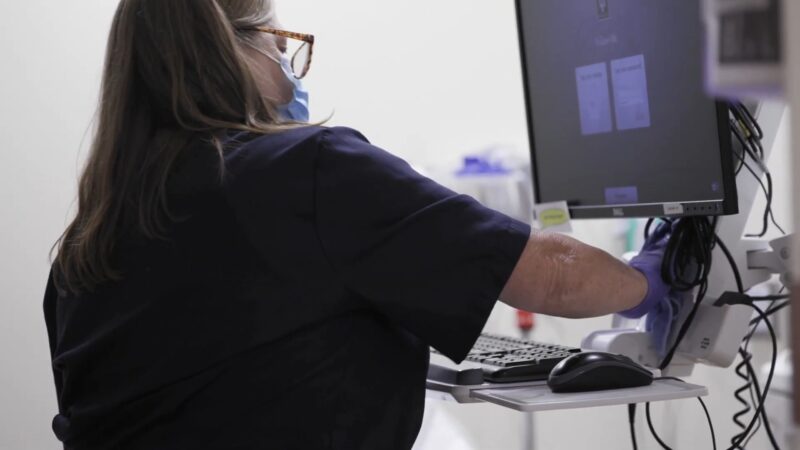
Average Annual Salary: $56,316
Environmental services technicians are responsible for cleaning, organizing, and sanitizing medical offices and rooms.
Their main tasks include emptying trash cans, sweeping floors, dusting, and sanitizing surfaces to remove biological contaminants.
Most environmental service technicians work full-time.
12. Psychiatric nurse
Average Annual Salary: $120,958
Psychiatric nurses specialize in caring for patients with mental illnesses or specific mental health needs.
They administer medications, record vital signs, manage basic care, and report any changes in a patient’s behavior or health to the attending physician.
Additionally, they often collaborate with families to develop optimal care plans for patients. Psychiatric nurses usually work full-time.
13. Licensed practical nurse

Average Annual Salary: $51,089
Licensed practical nurses (LPNs) offer routine care to patients in hospitals, long-term care facilities, or other medical settings.
Their responsibilities include monitoring and reporting vital signs, assisting with patient hygiene, communicating any changes to doctors or registered nurses, and ensuring that rooms are clean and sanitary.
LPNs also maintain communication with patients’ families and friends.
They typically work full-time and adhere to medical ethics and healthcare law.
Related Posts:
- What is Ambulatory Surgery? - Everything You Need to Know
- Direct Hernia vs. Indirect Hernia: What You Need to Know
- What’s Behind Gluten Sensitivity? 10 Causes You Need to Know
- Common Colonoscopy Questions: What You Need to Know
- The Risks of Back Surgery - What You Need to Know…
- 10 Most Dangerous Jobs in the U.S. by Injury Rate






